You have been diagnosed with infertility. You would do almost everything to become a parent and create a happy family. If IVF treatment with your own eggs is not possible in your case, you may end up looking for IVF treatment with donor eggs. If you are based in Australia you know very well that egg donation treatments in the country can be really difficult and expensive. If you don’t think treatment at home is the right option for you, it is time to consider affordable egg donation in Europe and follow hundreds of Australian couples who travel there to make their dreams come true.
Why do so many Australians travel to fertility clinics in Europe?
We, at EggDonationFriends, know that the decision to have IVF treatment with donor eggs is not easy for many couples and the egg donor shortage in Australia makes this even more difficult. Nowadays, a record 1 in 18 babies born in Australia is now conceived via IVF, very often performed abroad. This is approximately 10,000 babies each year.
First, let us have a look at what IVF with donor egg treatment looks like in Australia. In Australia, it is illegal to buy or sell any human tissue (oocytes, semen, embryos) and the IVF law allows only known egg and sperm donation. With anonymity no longer an option, many couples are turning to family members and friends to donate eggs to help complete the IVF process.
Sometimes, a woman connects with an Australian clinic to generously offer to donate their eggs, and the clinic puts them in touch with one of the patients, if suitable. However, it is not a frequent occurrence, therefore, the waiting lists are extremely long. It’s no secret that many women and couples are increasingly resorting to advertise for egg donors on the internet, due to the long waiting lists at clinics – but is this the best approach? This has left many unanswered questions about how to handle the situation ethically and responsibly.
What is more, legislative requirements for IVF with donor gametes across all Australian jurisdictions cover obligatory counselling sessions to discuss the implications of donation. Both the donor and the recipient (and the recipient’s partner if applicable) need to be present during such counselling sessions. This is compliant with the Practice Guidelines enforced by NHMRC, RTAC and ANZICA. As you can see, such a procedure requires a lot of time on both sides.
Additionally, a new study from Deakin University has found that limited access to assisted reproduction medicine is an issue affecting aspiring parents across rural and regional Australia. Lead researcher Christopher Mayes says “Some of the qualitative study’s participants were forced to make days-long round trips to capital cities for in-vitro fertilisation (IVF) or even simple blood tests.”
The question is: how to best support prospective Australian patients who do not have access to a suitable donor in their home country? There is a definite demand for more egg donors for Australian couples and if donor oocytes are not readily available in Australia, the solution lies abroad. Taking into account, that egg donation is freely accessible in most European countries with almost zero waiting time, it’s important to consider the benefits of travelling abroad for egg donation to make your dream come true, safely and legally and in a short period of time. IVF treatment with donor eggs/sperm at a European clinic is a no-hassle and affordable alternative to the lengthy and uncertain process back at home.
Looking for answers?
Best country for egg donation
Best fertility clinics in the world
The number of patients who travel for egg donation from Australia is increasing by 10-15% every year. As you might know, a few years ago, Australians used to fly to the United States to get IVF treatment. However, nowadays, egg donation costs in the USA have skyrocketed and become inaccessible for many patients. Also, the waiting times for a donor are too long. Fertility clinics in Europe are a solution for those Australians who would like to become parents on better terms and without breaking the family budget.
EggDonationFriends have collected some data on some of the most popular destinations for Australian fertility patients. Check the tables below and learn more about destination popularity, cost of ivf with donor eggs, success rates, and maximum woman age at clinics in Europe.
Top IVF Destinations Chosen by Australian Patients
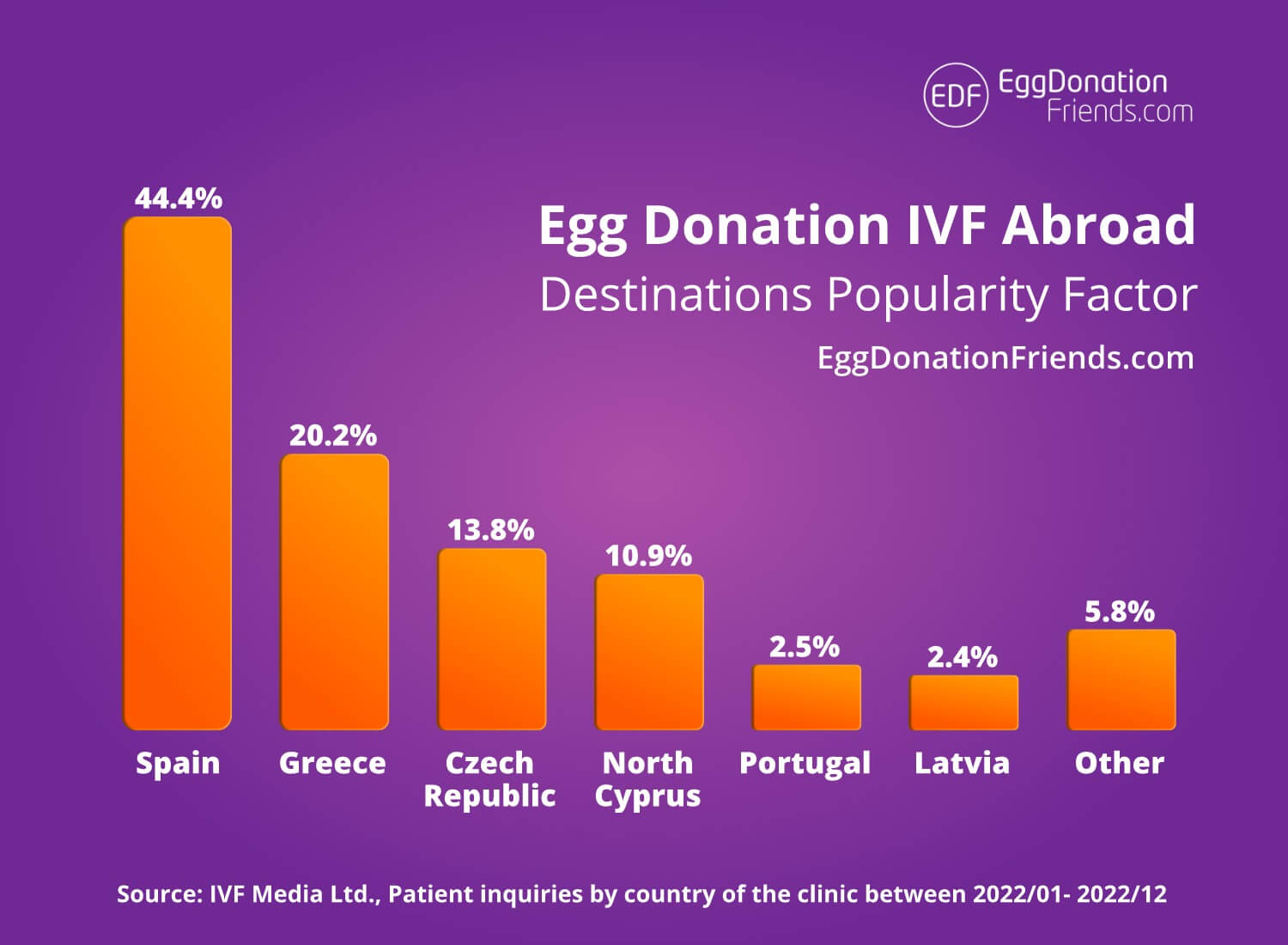
If you haven’t heard about the benefits of European fertility clinics, EggDonationFriends are here to help. In the past, high-quality, modern fertility clinics in Spain and the Czech Republic were the best-kept secret of Europe. Nowadays, as so many British, German, Swedish and Australian fertility patients visit European countries for their fertility problems, Europe has become a very popular IVF destination and a common topic on IVF Internet forums such as babycenter.com.au, bubhub.com.au. Egg donation in Europe is affordable, high quality and easily accessible. In almost every European country there are dozens of IVF clinics to choose from. They support international patients and their medical and patient care staff speaks English.
Compare the costs of egg donation treatment in Europe and the USA.
| Spain | Greece | Czech Republic | North Cyprus | Portugal | the U.S. | |
|---|---|---|---|---|---|---|
| average egg donation cost per cycle | €5,900 - €8,500 | €4,200 - €6,000 | €4,300 - €5,500 | €4,500 - €5,000 | €6,300 - €7,300 | €16,000-28,000 |
| average egg donation success rate | 55.1%* | 49.8%* | 42%* | no data* | 55%* | 49.5%** |
| age limit for eggs recipient | 50 - the age of menopause + 2 years | 54 (additional tests and qualification restrictions may apply to patients over 50) | 48 + 12 months | 58 (over 45 - subject to additional tests and Ministry of Health approval is required. woman over 55 - additionally require an ethical committee meeting with the presence of the patient) | 50 | No age limit |
*Source: ART in Europe, 2018: results generated from European registries by ESHRE. Supplementary Table SVIII Pregnancies and deliveries after ED (fresh and frozen cycles) in 2018. In Egg Donation cycles, the age of the recipient women had no influence on outcomes. Pregnancies per embryo transfer (fresh transfer).
**Source: Donor egg IVF cycle success rates for all donor egg cycles performed in selected American IVF clinics reported to the Centers for Disease Control and Prevention in 2020.
Looking for answers?
IVF at 49 with own eggs
Bear in mind that the above costs, while including donor fees, medication, and legal fees, do not include travel insurance, travel, accommodation, or any other unforeseen expenses which may occur.
Why do so many Australians travel for egg donation to Europe?
You might think it is too much effort to travel to a different continent for fertility treatment. However, there are 4 good reasons Australians are increasingly choosing European countries for their IVF treatment with donor eggs:
- Egg donation treatment in Europe is more affordable. It can be as much as three times lower than in the USA. Egg donation in European fertility centres is more affordable. All sorts of considerations go into these cost differences- from the cost of living in Europe to medication, treatment costs and staff expenses. In the USA, egg donors receive $8,500-$20,000 (€7,500-€17,000) after completing the egg donor cycle regardless of whether the intended parents conceive using the donor’s eggs. Whereas, egg donors in Europe receive on average €1,000-€2,000.
- Anonymous donors and no waiting lists. You can start your egg donation treatment at a date most convenient for you; you can even start immediately. As you know, anonymous donation is not allowed in Australia. Donors can be known or de-identified. Once a child is born using de-identified donor eggs, the identifying details of the donor are officially registered and when the child reaches their 18th birthday, they will be able to access this data. In short, egg donors can be legally traced should their future children wish to meet their genetic parents or siblings. As a consequence, very few Australian donors, female or male, are willing to donate because of this. In Europe, the regulations are entirely different. For instance, in the Czech Republic, Spain, Ukraine, Greece or Cyprus egg donors remain anonymous so many young women and men come forward to donate their eggs or sperm to other couples who dream about becoming parents. Additionally, many larger European fertility clinics have their own egg donor database and most work closely with egg donor banks on a regular basis.
- High success rates. Success rates for IVF treatment with donor eggs are high – the average egg donation success rates in European fertility centres vary from 57% to 67%. Moreover, egg donors in Europe are in their prime (usually below 30) and in perfect health. They are also genetically tested, tested for STIs, and often undergo psychological testing, as well.
Want more insights? Donor egg success rates - Flights and travel. If you are based in Australia, you can easily fly to any European country. You can travel to Spain, Greece or the Czech Republic on a 1-stop flight from Sydney, Melbourne, Perth, Brisbane, or Adelaide. Some of the airlines which fly to Europe are Virgin Australia, British Airways, Etihad Airways, Asiana Airlines, BlueBird Airways, etc.
Why is egg donation in Europe more convenient for Australians?
On the whole, European egg donation regulations are slightly more liberal and more convenient for patients than in Australia. That is why smart Australian IVF patients who are determined to become parents choose the best IVF clinics in Greece, Spain, the Czech Republic, North Cyprus, or Portugal. Here is what you should know about egg donation in Europe:
- Countries that are extremely popular destinations among Australians have different laws. According to regulations in those countries, a woman who gives birth to a child is their legal mother: very straightforward and convenient for egg donor recipients like you.
- Recipients and egg or sperm donors are fully anonymous. You may be asking yourself what patients think about anonymity. A survey was performed by clinics in Spain where egg donation patients were asked about this in a questionnaire. They were asked about their socio-demographic characteristics, their opinions concerning disclosure or secrecy of the conception method toward the child and the information the child should have access to (if any). They were also asked if they are planning to inform their child and family about the baby’s donor conception. The results showed 61% of heterosexual couples questioned planned on not telling their children that they were conceived through donation. The patients didn’t wish to know the donor’s identity and they didn’t consider that this knowledge is important to a child. The issue of disclosure vs. anonymity is ultimately an ethical issue.
- Sex selection is not legal in Europe, however, some clinics might be able to support patients with PGT-A/PGS testing results. Such embryo testing screens for chromosomal abnormalities and also reveals the sex of the embryo. In IVF clinics in North Cyprus, Belgium, Denmark, Greece, and Switzerland, sex selection is only permitted under specific circumstances: to prevent a serious genetic disorder that is linked to a specific sex. This means that when the doctor discovers that there is a chance of the baby inheriting a genetic disease that is linked to a specific sex, they may advise selecting the sex of the embryo to transfer to avoid complications. Some of the sex-linked traits include hemophilia, Duchenne muscular dystrophy, red-green colour blindness, congenital night blindness, some high blood pressure genes, and also Fragile X syndrome.
- Information about the donor. Depending on the European country, you will receive varying levels of detail in the data about the egg donor. Some countries provide very extensive egg donor profiles: some give less data. Among the information that may be provided are height and weight, hair and eye colour, skin tone, ethnicity, and, sometimes, even education or blood type. If you want to know more, go to Egg Donation Friends Guide.
Given the distance between Australia and Europe, many patients question our consultants whether it is possible to arrange treatment in a way that frequent flying back and forth would be eliminated. The answer is – YES, it is possible.
Many European clinics offer an initial online video consultation, either with a patient coordinator or with a fertility doctor. Such consultation may be free of charge or may bear a fee. However, many European clinics refund the cost of the first consultation once your treatment commences at their clinic.
All the arrangements with tests, medication and check-ups can be done in your home country prior to the physical visit to the clinic and that is limited to one time period of 7 to 16 days (depending on the therapy followed and treatment plan established by doctors). If you are curious about how the process of IVF with donor eggs is being conducted and which aspects are crucial, then you definitely need to read the Donor egg IVF treatment process abroad revealed – what to know to save time, energy and money. Thanks to this article you will know all about the IVF process with donor eggs and what is essential in communication with the clinic and what is often missing in such communication.
Keep in mind that your goal when starting the therapy is to be pregnant and not to simply save time or cut costs. Note that your OB-Gyn is able to help you with preparation for the treatment by cooperating with doctors from the clinic of your choice, in your home country. Most of the clinics are open to direct cooperation with local doctors. Make sure that you enquire about this option during your first consultation.
Egg donation in Spain
The egg donation clinics in Spain listed on EggDonationFriends.com have an average egg donation success rate per embryo transfer of 63%. This is confirmed by statistics from the Spanish Fertility Society. Numerous Spanish IVF clinics offer egg donation programmes that conform to ISO standards. In Spain, IVF costs with your own eggs start from 3,900 Euros. The average IVF cost with donor eggs is only 6,500 Euros, much lower than in Australia.
Want more insights?
IVF with donor eggs Spain
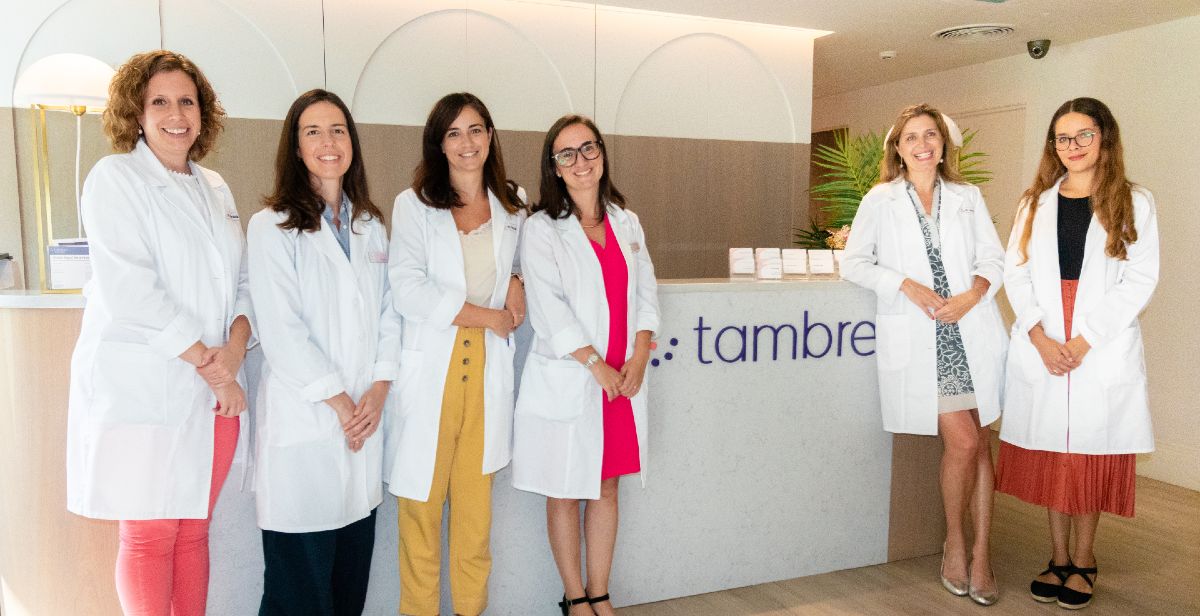
Let us also look at the cost of frozen embryo transfers in Spain and in Australia. If your first cycle fails or when you wish to go back to the clinic to have a sibling for your first IVF baby, you will need to undergo Frozen Embryo Transfer (FET) using the frozen embryos that were previously created for you. In Spain, FET costs between 950-1,500 Euros, whereas in Australia you would have to fork out between 1,700-2,600 Euros. This means you won’t break the bank when deciding on treatment in Barcelona, Alicante or Madrid.
IVF clinics in Spain have many patients from overseas, especially in Australia. That is why they offer additional services such as online consultation, airport or hotel pickup/drop off, or the possibility of contacting the clinic in an emergency.
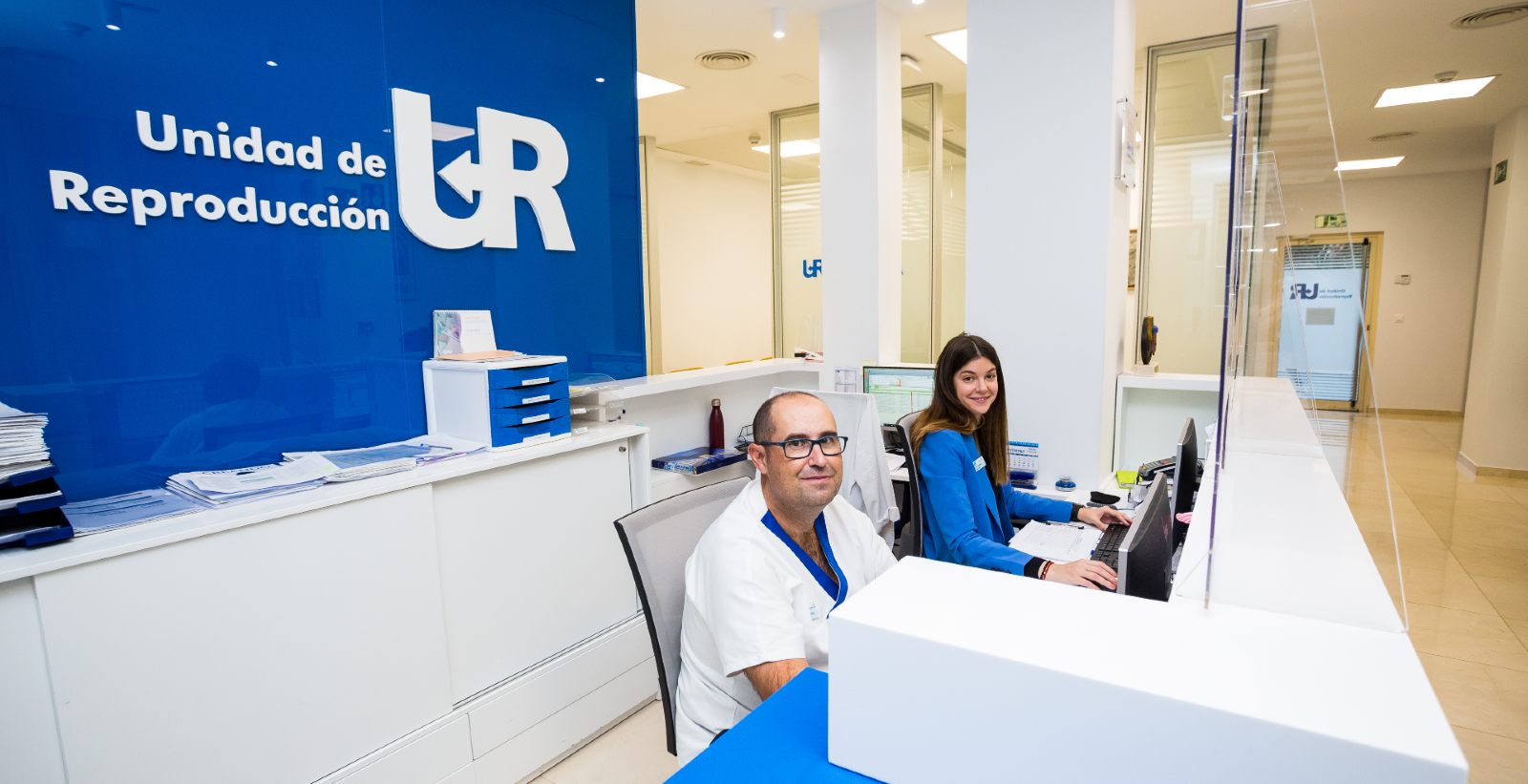
Egg donation in the Czech Republic
Czech fertility clinics are also a popular IVF destination among Australian IVF patients who are searching for egg donation programmes with high success rates at affordable prices. In most Czech clinics you can have IVF treatment with either fresh or frozen eggs. The average IVF egg donation success rate here is approximately 42% (ESHRE data for 2018) and the average egg donation price is 4,300-5,500 Euros. Experienced Czech fertility specialists are trained in the most recent egg donation procedures and work with state-of-the-art equipment. As mentioned above, according to Czech law, egg donation is anonymous. International patients can receive only basic information about egg donors, without the donor’s pictures. Usually, there are no long waiting times for an egg donor, as many Czech infertility clinics have their own banks of donor eggs.
If you are considering undergoing an egg donation procedure in the Czech Republic, you might also visit such beautiful Czech cities as Prague, Brno or Ostrava. These cities are very popular touristic and fertility destinations among patients from Ireland, the UK, Germany, Austria and Australia. Transport in the country is convenient and comfortable. The Czechs are friendly and there are numerous places worth seeing.
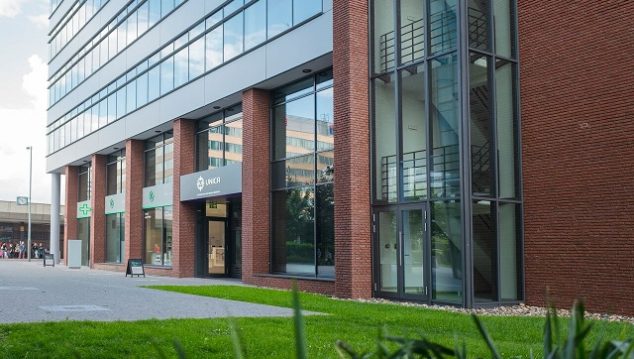
Egg donation in North Cyprus
Fertility clinics in North Cyprus offer egg donation treatment at the cost of 4,500-5,000 Euros. This cost does not include medication but it may include clinic-hotel transfers and the initial consultation. It is a fertility destination for international patients from the UK, France, Germany and other countries. IVF patients visit egg donation clinics in North Cyprus, not only because of their high-quality treatment, minimal waiting times and a good choice of young healthy egg donors, but also for the sunniest climate in the Mediterranean. Many patients say the warm climate has a positive effect on their mood during this difficult and sometimes stressful time. In fact, it has been confirmed that the clinical pregnancy rates of cycles starting ovulation induction in spring, summer, and autumn were significantly higher than those starting in winter. It is also found that the pregnancy rate and birth rate are also improved in the women exposed to more sunshine the month before they start their IVF cycle, while the egg was maturing.
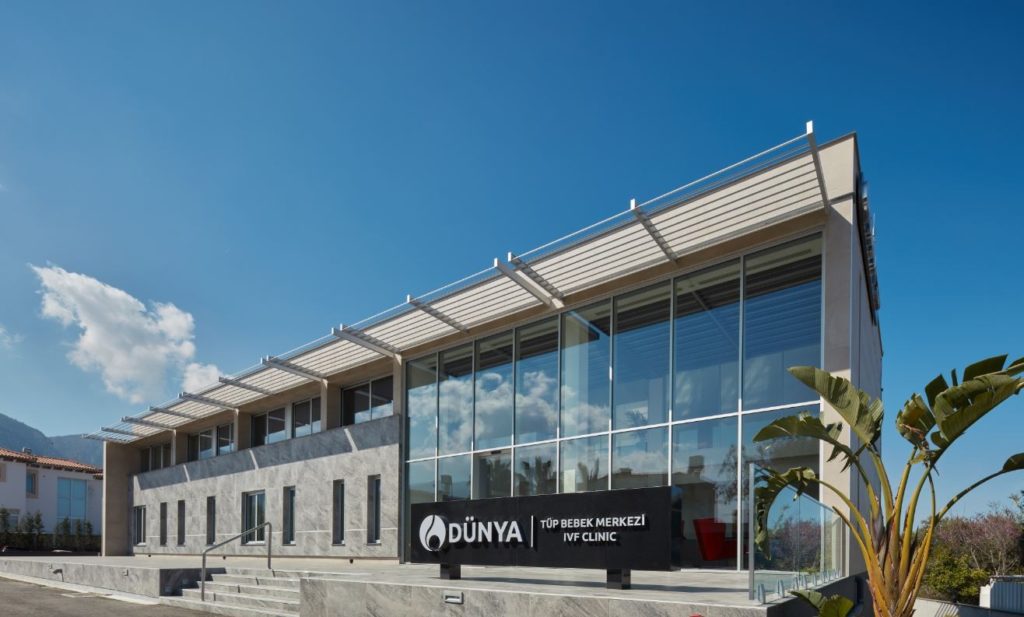
Other frequently chosen IVF destinations
Egg Donation in Greece
Greece is also a great destination for affordable egg donation in Europe, with as many as 60 IVF clinics to choose from. The average egg donation success rate is similar to other European destinations at 49.8%. Donating eggs is anonymous, and there are no waiting times so you can have your treatment at a time most convenient for you. Egg donors are meticulously screened (hepatitis B, hepatitis C, HIV, syphilis) to ensure patient safety and top-quality oocytes. The average cost of egg donation in Greece is 4,200-6,000 Euros, making this country one of the most attractive places to have treatment and conceive a child. If you want to save up to 70% on your fertility treatment abroad, check the list of affordable IVF clinics in Greece.
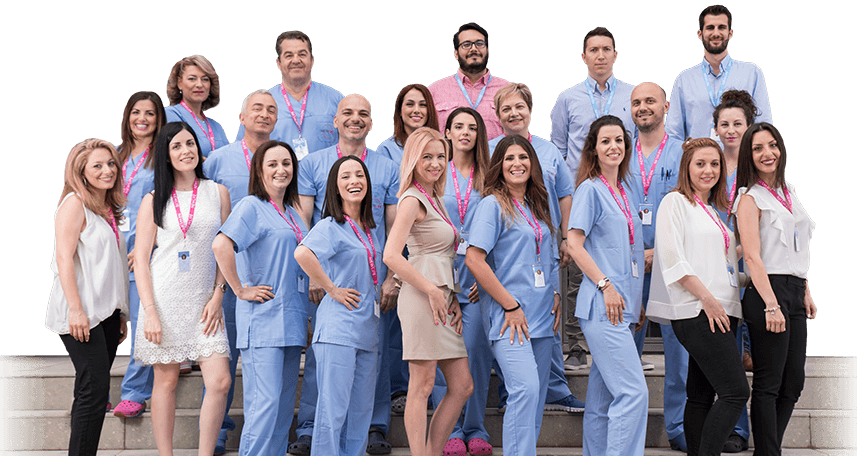
Egg donation in Portugal
Portugal may not seem like an obvious choice for egg donation treatment in Europe, but you should know that with as many as 24 IVF clinics to choose from and affordable pricing, it is a little gem. The average egg donation success rate in Portuguese clinics is 55%. An interesting fact about Portugal is that egg donation there is not anonymous, however, the entire process is much more straightforward than in Australia. Portuguese clinics manage to provide a fairly large pool of donors so there is no waiting time. You can have your treatment at a time most convenient for you.
The average cost of egg donation in Portugal is 6,300-7,300 Euros, making it attractive for Australians. The donor ethnicities available include Caucasian, Hispanic, Scandinavian, African, Asian, Indian, and Arab. Certainly, the selection varies per clinic. We recommend enquiring about the donor options directly with a Portuguese clinic of your choice.
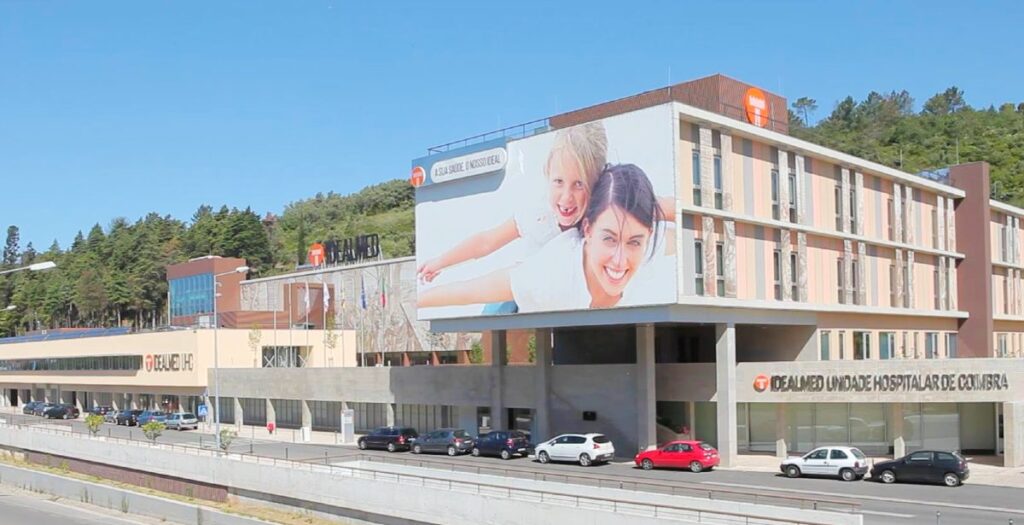
If you haven’t considered travelling to Europe for egg donation before, now you know. It is a common practice among infertile couples in Australia looking for smarter, better solutions, and affordable prices. Let EggDonationFriends help you find price-friendly, high-quality egg donation in Europe. Simply spend 2 minutes completing our Clinic Matching Test and save hours of endless Internet searching. We’ll do the legwork for you. After we receive your form, EggDonationFriends consultants will get back to you with the 3 best offers from top-rated IVF clinics.
If you’re a patient based in the UK thinking about egg donation treatment, you may be interested in the article Egg Donation in the UK – costs, law and donor availability.
Table of Contents






Hi, I’m curious to know why you haven’t listed South Africa at all, I run a website in regard to egg donation in Australia and a Facebook support group purely for recipients looking at/or have gone overseas and many have been and are going to South Africa.
And if your stats are from forums like bub hub, there are many going to South Africa on there as well…
Thanks Dianne
My family is from Australia and they went to Cyrprus for their ivf. They couldn’t do it in australia I figure.
Hi, Dianne. Thank you for your comment. Yes, indeed some Australians travel to South Africa, however, they are mostly interested in Caucasian white egg donors so Europe is a convenient and affordable destination for them.
In January me and my wifey started looking for best fertility clinics. Europe IMHO has the best clinics in the world. and the most pocket-friendly ones. We seriously consider Spain or Greece.
Hi my wife and inare researching from Australia .. We would love to hear from anyones experience particularly in Spain and Greece . Is there a clinic in Spain / Greece that does egg and sperm donoation?
IVF Spain mentions Alicante alot, is that the better option than the clinics inBarcelona and Madrid?
Hi, we are in Australia and have just begun our search for egg donation treatment. Our fertility specialist provided options of treatment abroad in both Spain and South Africa. Interestingly he also provided the option of having treatment in Australia with imported vitrified eggs. There are a couple of independent clinics in Australia offering this, it might be a viable option for some.
Bethel,
good luck with your egg donation treatment! If you need more info, don’t hesitate to get in touch with us.
We’re from Sydney and also looking into the option of egg donation. Australia doesn’t seem to be the best place to find a donor.we want an anonymous donor.
who was born to a Thai surrogate mother and allegedly left behind by the intended Australian parents, has caused international controversy. Where do people go to arrange for surrogate babies, and is it legal?